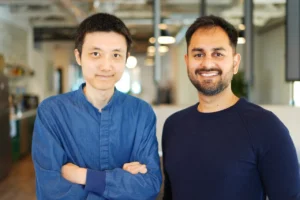THE NEWS: What Happened
The market research industry, long dominated by expensive human consultants and time-consuming surveys, faces disruption from conversational artificial intelligence as traditional methods prove inadequate for modern business velocity. Keplar, a voice AI startup founded by former Google engineers Dhruv Guliani and William Wen, has raised $3.4m in seed funding led by Kleiner Perkins, with participation from SV Angel, Common Metal, and South Park Commons, to automate customer interviews that typically cost Fortune 500 companies tens of thousands of dollars and weeks of waiting time.
The two-year-old company emerged from South Park Commons’ founder fellowship programme after the founding team identified fundamental inefficiencies in how brands gather customer insights. Traditional market research firms charge premium rates for services involving human moderators conducting phone interviews and analysing written surveys—processes that Keplar’s voice AI platform can complete in minutes rather than weeks while providing similar analytical depth at substantially lower cost.
Keplar’s platform transforms any research question into an interview moderation guide, deploying voice assistants to conduct natural conversations with customers that participants often mistake for human interactions. The AI researchers can access client CRM systems to reach existing customers directly, generating comprehensive reports and presentations identical to traditional market research deliverables. Early customers include major brands like Clorox and technology companies like Intercom, indicating enterprise acceptance of AI-generated market intelligence across diverse industry verticals.
THE INTELLIGENCE: What It Means
This funding round signals the beginning of systematic automation across professional services industries, with market research serving as an early indicator of how AI capabilities are reaching sufficient sophistication to replace highly skilled human work rather than merely augmenting it. Kleiner Perkins’ lead investment reflects recognition that voice AI has crossed critical thresholds of naturalness and analytical capability, creating opportunities to capture value from established industries with entrenched pricing power and lengthy service delivery cycles.
The competitive landscape reveals investor confidence in AI disruption across traditional consulting sectors. With Outset raising $17m from 8VC and Listen Labs securing $27m from Sequoia in recent months, the market research automation sector is attracting significant capital despite serving a relatively niche application. This suggests investors view market research as a beachhead for broader professional services automation, with successful companies potentially expanding into adjacent consulting categories requiring similar customer interaction and analytical capabilities.
The technology maturation timeline appears critical for understanding broader AI automation trends. Guliani’s emphasis that “relying on voice bots before advancements in LLMs would not have been possible” indicates that multiple AI capabilities—natural language understanding, conversational flow management, and analytical synthesis—have converged to enable whole industry disruption rather than incremental efficiency improvements. This convergence pattern may predict similar disruptions across other industries dependent on human conversation and analytical synthesis.
The customer adoption by established brands like Clorox suggests enterprise willingness to substitute AI for traditional professional services when quality and cost advantages are substantial. Unlike experimental AI applications that require behaviour change or new workflows, Keplar provides identical deliverables through different production methods, reducing adoption friction while capturing significant cost savings. This seamless substitution model may prove more scalable than AI applications requiring customers to adapt existing business processes.
The pricing and timing advantages create substantial competitive moats against traditional research firms. Market research projects costing tens of thousands of dollars and requiring weeks for completion cannot compete with automated systems providing similar insights in minutes at fraction of the cost. However, this disruption may force traditional firms to develop AI capabilities or focus on specialized research requiring human judgment that AI cannot yet replicate.
The timing reflects broader trends in enterprise AI adoption, where companies are moving beyond experimental applications toward core business process automation. As economic pressures intensify focus on operational efficiency, AI solutions that demonstrably reduce costs while maintaining quality may experience accelerated adoption across multiple professional services categories simultaneously.
THE BRIDGE: What To Do About It
For venture capitalists evaluating professional services disruption opportunities, Keplar’s funding success highlights investment themes that extend far beyond market research toward systematic automation of knowledge work requiring human conversation and analytical synthesis. The most compelling applications appear to be AI platforms that can seamlessly replace established professional services while providing identical deliverables at substantially lower cost and faster turnaround times.
Similar opportunities requiring immediate evaluation:
- AI-powered business consulting: Companies automating strategic analysis, competitive research, or operational assessments traditionally provided by management consulting firms, particularly those serving mid-market companies unable to afford premium consulting rates
- Automated legal research and document review: Platforms replacing junior associate work in law firms, focusing on contract analysis, regulatory compliance, or due diligence processes where AI can provide comparable accuracy at significantly reduced cost
- AI-driven financial analysis and reporting: Startups automating investment research, financial modeling, or regulatory reporting traditionally performed by analysts and consultants in financial services sectors
Active investors in professional services automation:
- Kleiner Perkins: Now demonstrated conviction in AI platforms disrupting established professional services industries, likely seeking similar opportunities across consulting, legal, and financial services sectors
- Sequoia Capital: Significant investment in Listen Labs indicates broader thesis around AI automation of knowledge work, particularly platforms serving enterprise customers with established service provider relationships
- 8VC: Investment in Outset suggests interest in AI companies targeting traditional industries with high service costs and lengthy delivery cycles, especially those with clear ROI demonstration capabilities
- Accel Partners: Portfolio includes multiple enterprise AI companies, indicating systematic evaluation of professional services disruption opportunities across various industry verticals
For founders targeting professional services automation, Keplar’s approach provides strategic guidance about building sustainable competitive advantages through quality parity combined with dramatic cost and speed improvements rather than attempting to create superior analytical capabilities that justify higher pricing. The key insight involves identifying services where AI can achieve comparable outcomes through different production methods rather than competing on enhanced capabilities that customers may not value sufficiently to justify switching costs.
Market timing appears critical for professional services AI companies, with enterprise customers increasingly willing to evaluate AI alternatives as economic pressures intensify cost reduction priorities. Companies that can demonstrate immediate ROI through existing budget reallocation rather than requiring additional investment may experience faster adoption cycles and higher customer retention rates.
Industry selection should prioritize sectors with established service providers charging premium rates for standardized deliverables, creating clear value propositions for AI substitution. Professional services categories dependent on regulatory relationships, creative judgment, or complex stakeholder management may prove more resistant to AI disruption than those focused on analytical synthesis and report generation.
Customer acquisition strategies should emphasize seamless integration with existing business processes rather than requiring workflow changes that create adoption barriers. Keplar’s ability to integrate with client CRM systems and provide identical deliverable formats reduces implementation friction while demonstrating immediate value through familiar output structures.
For established professional services firms evaluating competitive responses to AI disruption, the Keplar model suggests that technology adoption may prove necessary for survival rather than competitive advantage. Firms that can successfully integrate AI capabilities while maintaining client relationships and specialized expertise may capture productivity benefits, while those resisting automation may face systematic competitive disadvantages as AI quality continues improving and costs continue declining.
International expansion opportunities exist for professional services AI companies, particularly in markets where traditional consulting services are expensive or unavailable. Emerging markets with limited access to premium professional services may provide substantial addressable markets for AI platforms offering comparable capabilities at accessible price points.








